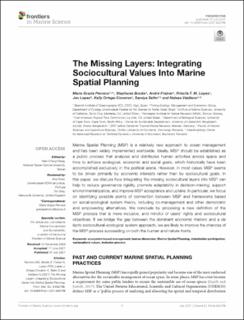| dc.contributor.author | Pennino, Maria Grazia | |
| dc.contributor.author | Brodie, Stephanie | |
| dc.contributor.author | Frainer, André | |
| dc.contributor.author | Lopes, Priscila F.M. | |
| dc.contributor.author | Lopez, Jon | |
| dc.contributor.author | Ortega-Cisneros, Kelly | |
| dc.contributor.author | Selim, Samiya | |
| dc.contributor.author | Vaidianu, Natasa | |
| dc.date.accessioned | 2022-03-25T08:19:17Z | |
| dc.date.available | 2022-03-25T08:19:17Z | |
| dc.date.created | 2021-08-02T11:16:53Z | |
| dc.date.issued | 2021 | |
| dc.identifier.citation | Frontiers in Marine Science. 2021, 8 . | en_US |
| dc.identifier.issn | 2296-7745 | |
| dc.identifier.uri | https://hdl.handle.net/11250/2987543 | |
| dc.description.abstract | Marine Spatial Planning (MSP) is a relatively new approach to ocean management and has been widely implemented worldwide. Ideally, MSP should be established as a public process that analyzes and distributes human activities across space and time to achieve ecological, economic and social goals, which historically have been accomplished exclusively in the political arena. However, in most cases MSP seems to be driven primarily by economic interests rather than by sociocultural goals. In this paper, we discuss how integrating the missing sociocultural layers into MSP can help to reduce governance rigidity, promote adaptability in decision-making, support environmental justice, and improve MSP acceptance and uptake. In particular, we focus on identifying possible points of connection between MSP and frameworks based on social-ecological system theory, including co-management and other democratic and empowering alternatives. We conclude by proposing a new definition of the MSP process that is more inclusive, and mindful of users’ rights and sociocultural objectives. If we bridge the gap between the dominant economic rhetoric and a de facto sociocultural-ecological system approach, we are likely to improve the chances of the MSP process succeeding on both the human and nature fronts. ecosystem based management, human dimension, Marine Spatial Planning, stakeholder participation, sociocultural values, inclusive process | en_US |
| dc.language.iso | eng | en_US |
| dc.rights | Navngivelse 4.0 Internasjonal | * |
| dc.rights.uri | http://creativecommons.org/licenses/by/4.0/deed.no | * |
| dc.subject | ecosystem based management | en_US |
| dc.subject | human dimension | en_US |
| dc.subject | Marine Spatial Planning | en_US |
| dc.subject | stakeholder participation | en_US |
| dc.subject | sociocultural values | en_US |
| dc.subject | inclusive process | en_US |
| dc.title | The Missing Layers: Integrating Sociocultural Values Into Marine Spatial Planning | en_US |
| dc.type | Peer reviewed | en_US |
| dc.type | Journal article | en_US |
| dc.description.version | publishedVersion | en_US |
| dc.rights.holder | © 2021 The Authors Pennino, Brodie, Frainer, Lopes, Lopez, Ortega-Cisneros, Selim and Vaidianu | en_US |
| dc.subject.nsi | VDP::Zoologiske og botaniske fag: 480 | en_US |
| dc.subject.nsi | VDP::Zoology and botany: 480 | en_US |
| dc.source.pagenumber | 0 | en_US |
| dc.source.volume | 8 | en_US |
| dc.source.journal | Frontiers in Marine Science | en_US |
| dc.identifier.doi | 10.3389/fmars.2021.633198 | |
| dc.identifier.cristin | 1923374 | |
| dc.relation.project | Andre: e U.S. National Science Foundation (Grant OCE-1840868) | en_US |
| cristin.ispublished | true | |
| cristin.fulltext | original | |
| cristin.qualitycode | 1 | |

